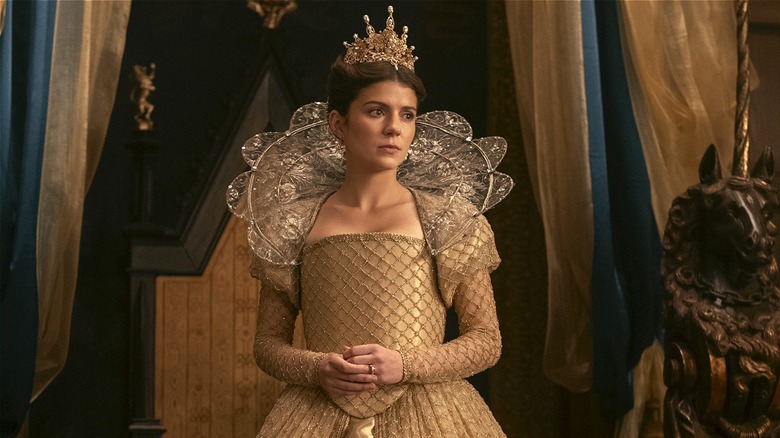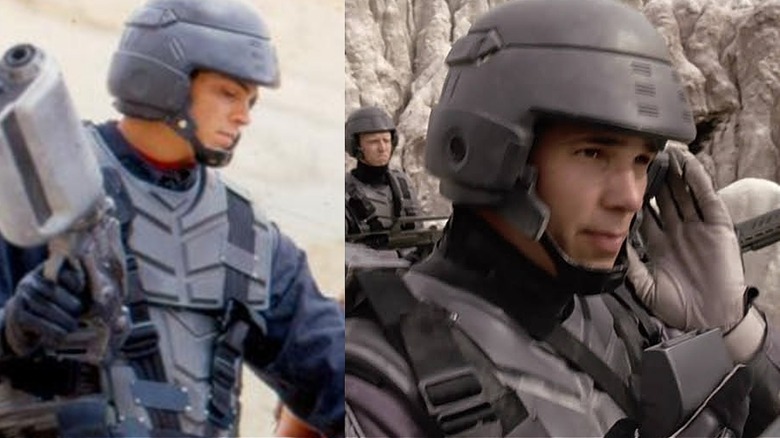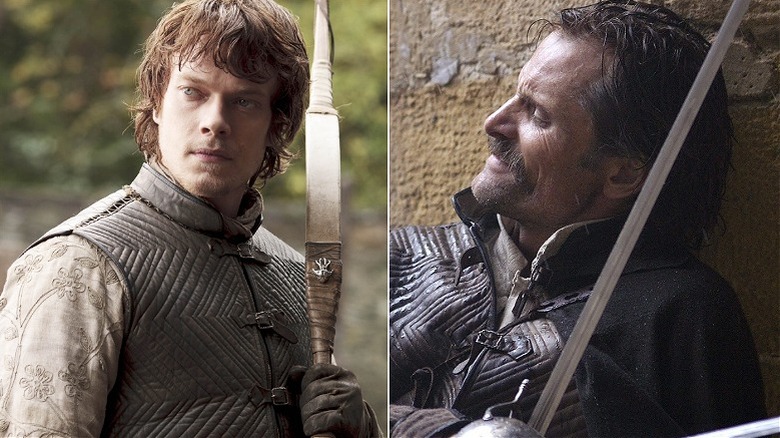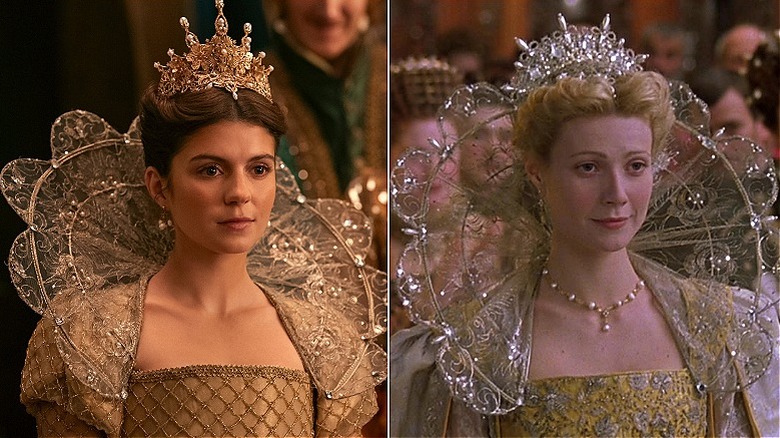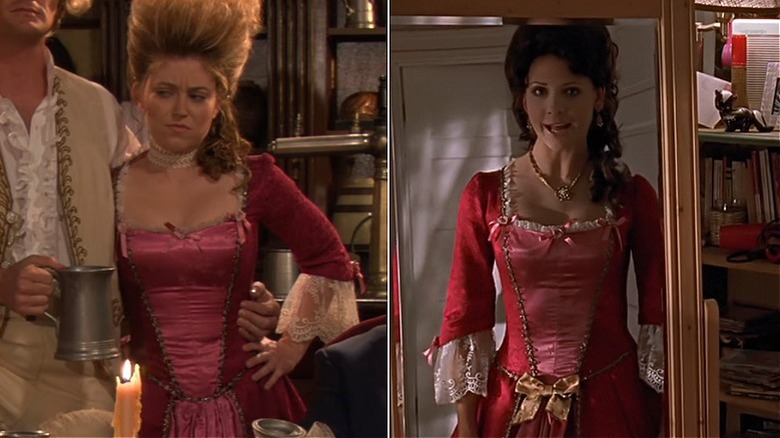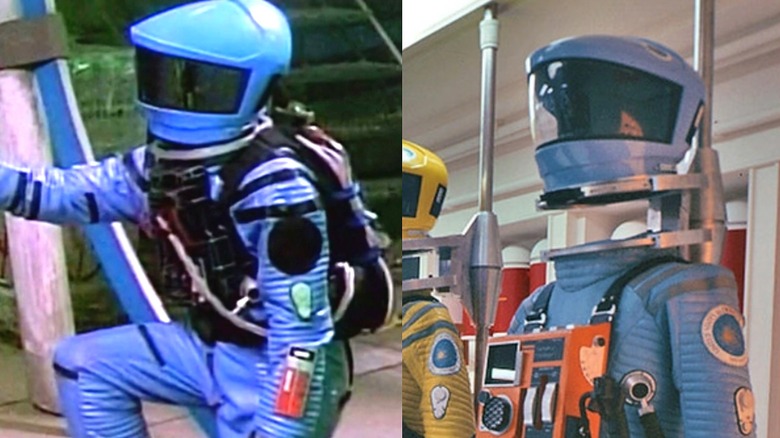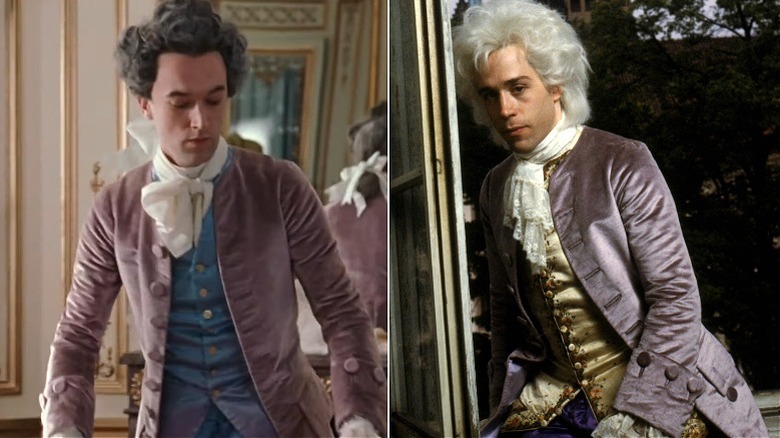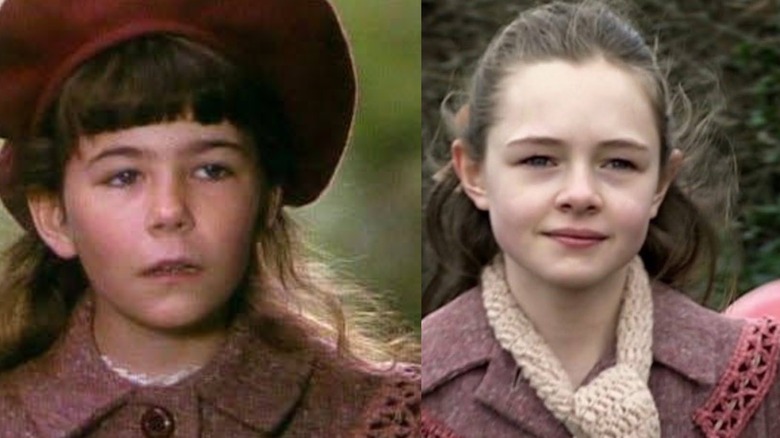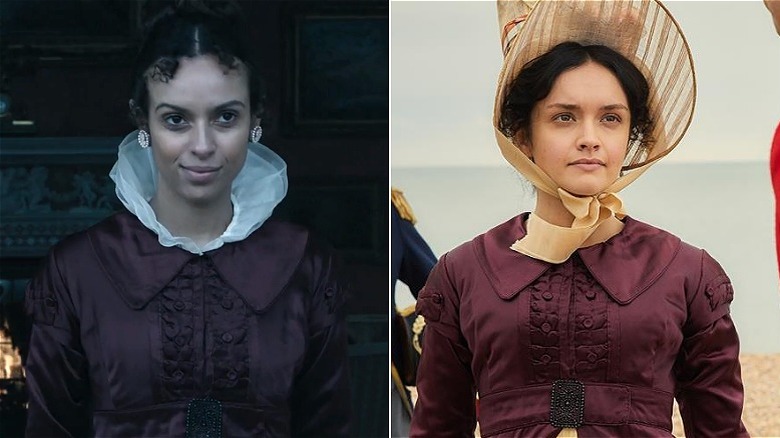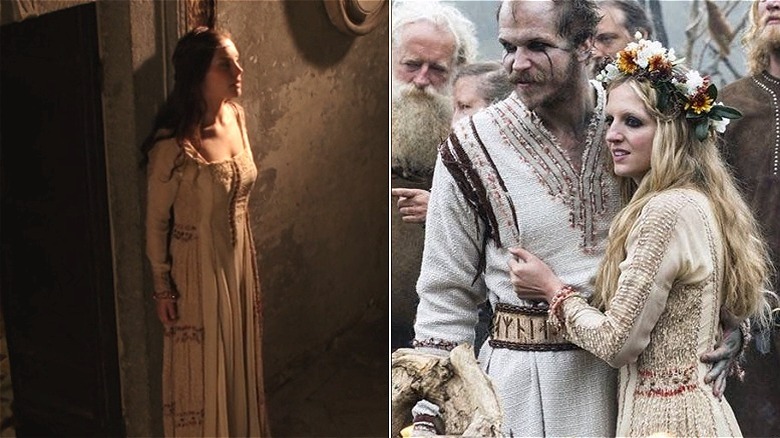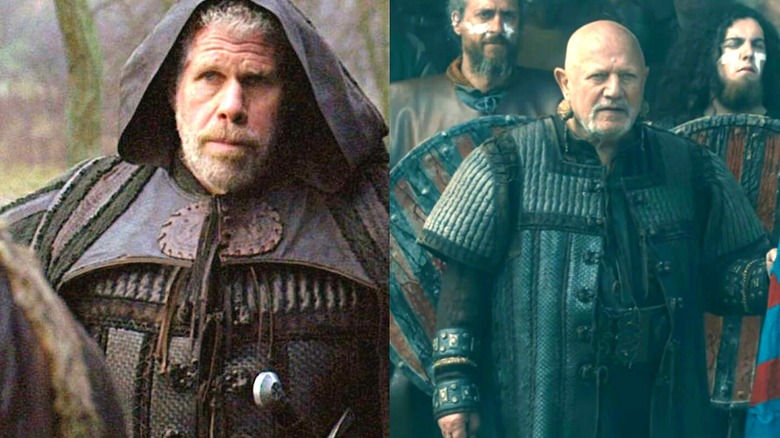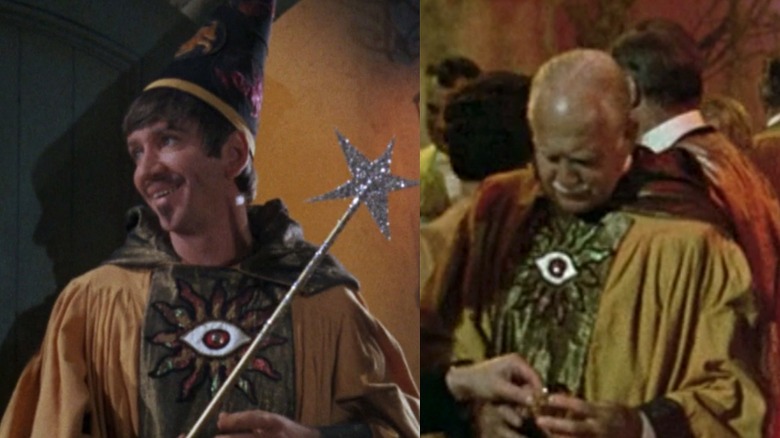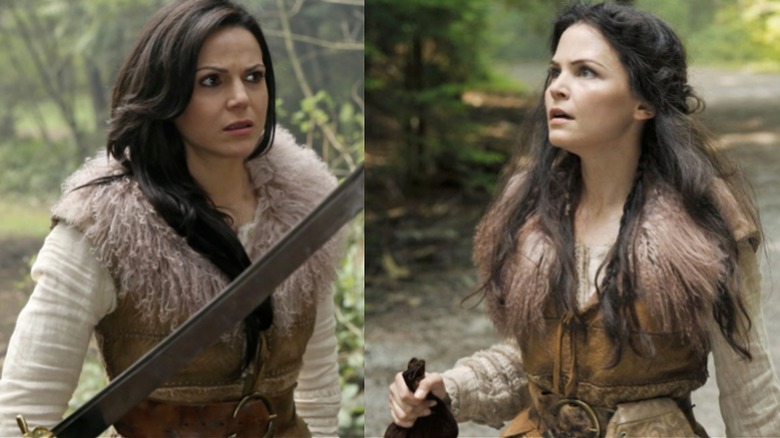Whether the movie in question is a historical drama, a superhero film, or just a regular old comedy set in the present day, quality costumes can make all the difference when it comes to pulling off a solid production. A great deal of care, cash, and craftsmanship goes into creating the most iconic costumes and props in the TV and movie business, so it makes sense that at least some of them would get a chance to live again in a later production.
Although plenty end up at auction, with some props and costumes fetching shockingly expensive amounts, many more head to costume houses, where there’s always a chance we’ll see them again. Spotting them is the purview of websites like Recycled Movie Costumes, which catalogs dozens of examples of movie costume reuse thanks to eagle-eyed viewers happy to upload their finds.
We’ve combed the internet to pull together some of the best examples of TV and movie costume recycling, including one historical piece that can’t seem to get enough screentime. The only thing left to do is to answer the age-old question of which character wore it best.
Starship Troopers combat uniforms show up in Power Rangers and Firefly
Featuring an aesthetic straight out of a 3D printer’s tamest imagination, the matte charcoal body armor and helmet of the United Citizen Federation in “Starship Troopers” is a pretty standard futuristic combat uniform staple. At various points in the film, this armor can be seen worn over the soldiers’ entire uniforms or just directly on top of the simple, battle-friendly black t-shirts worn under combat soldiers’ uniforms in the film. The mobile infantry and fleet soldiers also rock M-3 combat helmets fitted with integrated communications systems.
Loads of these uniforms were created for the production, so it should come as no surprise that they’ve been reused at least twice and are still found in prop shops today. The helmets resurfaced two years later in the low-budget tokusatsu series “Power Rangers: Secrets of the Lost Galaxy,” where they were fittingly worn by the human colonists as they battled their insectoid foes. The “Starship Troopers” uniforms resurfaced again in “Firefly,” albeit with a fresh coat of purple paint. They also appear in the 2001 Gary Sinise sci-fi film “Imposter,” the 2001 series “Power Rangers Time Force,” and the 2001 Mark Wahlberg-starring adaptation of “Planet of the Apes.”
GOT’s Theon Greyjoy rocked a leather costume worn by Viggo Mortensen in Alatriste
Thanks to Ramsay Bolton’s (Iwan Rheon) torture techniques and the seemingly endless string of tragedies Theon Greyjoy (Alfie Allen) experiences through his lifetime, “Game of Thrones” really puts the arrogant character through it. The one good thing he does have going for him at the beginning of the series, before his life takes the fast track to Dreadfort, is an absolutely baller leather doublet characterized by an ornate pattern of tight strips angled in a large zig-zag pattern.
But while the doublet seems perfect for Theon, it was actually borrowed from an earlier production, having appeared on fantasy actor Viggo Mortensen in “Alatriste,” a 2006 epic historical war film based on Arturo Pérez-Reverte’s novel series “Las Aventuras del Capitán Alatriste.” Whether accessorized with Theon’s stunning fur-topped cloak or Alatriste’s simple black cloak, the elaborate leatherwork is the star of the actors’ costumes in both productions.
My Lady Jane repurposed an Elizabethan ruff worn in Shakespeare in Love
Both “Shakespeare in Love” and “My Lady Jane” are examples of decadent period dramas set in the Tudor era that take major liberties with the history side of things — in all of the best ways, of course. And goodness knows those Elizabethans appreciated their over-the-top fashions — especially elaborate ruffs. The trend first took off in the late Tudor era around the time Queen Elizabeth I took the throne and gradually evolved into the ornate open-fronted variations that framed women’s faces, collars, and chest areas.
The version worn by Gwyneth Paltrow’s Viola in the 1995 romantic period film “Shakespeare in Love” is a gorgeous tribute to the era’s favorite fantasy trend. Designed by award-winning costume designer Sandy Powell, the decadent, open-wired ruff creates a sheer, glittering halo around Viola’s head, reminiscent of the dreamy fit rocked by Liz I in painter Marcus Gheeraerts the Younger’s 1592 Ditchley Portrait. Both angelic and regal, all at once, Viola’s ruff features gold detailing and elegant pearl accents.
Just over two decades later, the ruff would appear once more — sans pearls — on Beth Cooke’s Mary, Queen of Scots in the 2016 BBC film “Bloody Queens: Elizabeth & Mary” before dressing Jane Grey (Emily Bader) in “My Lady Jane.” Showrunners Gemma Burgess and Meredith Glynn have said they dreamed of using the piece and were delighted when their costume designer found it hanging out in a costume house.
How I Met Your Mother recycled a Georgian gown worn on Buffy: The Vampire Slayer
The second season “Buffy: The Vampire Slayer” episode, “Halloween,” finds Buffy (Sarah Michelle Gellar) and the Scooby Gang roped into trick-or-treating with a group of younger kiddos. Hoping to make a big splash with Angel (David Boreanaz), Buffy decides to go big with a darling satin cerise pink Rococo dress with lacy sleeves and pretty apricot-colored bows. It looks more like a costume shop version of an 18th-century dress than a historically accurate version, but it’s still perfectly lovely, and Buffy wears it well.
Although it’s a far less prominent appearance, the Princess Peach-colored dress shows up again, a little more than a decade later, in another Alyson Hannigan-starring series, “How I Met Your Mother.” Worn by an extra, the dress appears in Barney’s (Neil Patrick Harris) flashback of his coming up with the Bro Code.
Babylon 5 used a costume from 2001: A Space Odyssey
“2001: A Space Odyssey” might present a dark and disturbing vision of the future, but its fashions are anything but, thanks to director Stanley Kubrick’s decision to bring couture house designer Hardy Amies on board. The spacesuits seen on Discovery I rank as some of the most iconic costumes of all time, all lined up in a gorgeous Crayola-colored cassette futurist vision of ketchup red, mustard yellow, and periwinkle blue.
Unlike its red and yellow brethren, the pastel blue spacesuit is never worn in the movie nor in its 1984 sequel, “2010: The Year We Make Contact,” where it appears sans its blue helmet, implying that Dave Bowman used it to disable HAL. However, the ribbed blue spacesuit, which features a large, blocky tangerine orange control apparatus affixed to the chest, reappears in “Babylon 5” where it’s worn in episodes “Babylon Squared” and “War Without End: Part 2.” The look is updated somewhat, with the blocky control apparatus replaced by a slick black version that matches black detailing that was added where a silvery gray was previously.
Mozart’s coat from Amadeus popped up again in Marie Antoinette
The Tom Hulce version of Wolfgang Amadeus Mozart at the center of the 1984 film “Amadeus” is the ultimate party boy, decked out in all the best drip that 18th-century fashion has to offer. This means he wore luxurious velvets, satins, and silks paired with the most over-the-top powdered wigs a Rococo-era former child star could possibly dream of. One of his best fits involves a candy-colored lilac justaucorps, the fancy name for those knee-length coats that look so slick in “Hamilton.” The vibrant, Easter egg-hued piece, which Mozart wears paired with a dandy gold vest and lacy white cravat around his neck, was likely one of the many reasons costume designer Theodor Pištěk won an Oscar for his “Amadeus” creations.
It was also the perfect costume to resurface again just over two decades later in Sofia Coppola’s “Marie Antoinette,” another 18th-century period film strategically rife with anachronisms that made good use of vivid, splashy pastels. Although it doesn’t get much play, it can be seen on an extra, paired with a cornflower blue vest and flowy white cravat.
Mary Lennox’s Secret Garden coat showed up on Doctor Who’s Family of Blood
Frances Hodgson Burnett’s 1911 “The Secret Garden” has been adapted for the big and small screen quite a few times, beginning with the 1918 film version. A tale of an orphaned girl raised in British India, only to find herself uprooted to the Yorkshire Moors when her parents die of cholera, “The Secret Garden” even has a 1992 anime version titled “Anime Himitsu no Hanazono,” and every fan of Mary Lennox’s saga has their favorite adaptation. But the star of the 1987 adaptation, a Hallmark made-for-TV version, is Contrary Mary’s (Gennie James) dusty mauve coat, a simple tweed peacoat with ornate loop-braided cord trim laid across the shoulders almost like epaulettes.
A sweet little coat for a lovely girl, the peacoat shows up again two decades later in the “Doctor Who” two-parter “Human Nature/The Family of Blood,” appearing on an alien hunter in the form of an innocent little girl (Lor Wilson).
A coat dress from Napoleon has been in everything
Every once in a while, there’s a piece of costume department gold that’s so useful it keeps popping up in productions again and again. Such is the case with a specific, beautifully tailored, eggplant-colored pelisse, a type of full-length, empire-waisted overdress worn throughout much of the 19th century, that has appeared in a handful of productions to date.
The dress seems to have first appeared in the Maggie Smith-starring 2009 fantasy film, “From Time to Time.” It shows up again in 2013’s three-part miniseries, “Death Comes to Pemberley,” a mystery that picks up with the Darcys (Matthew Rhys and Anna Maxwell Martin) of “Pride and Prejudice” a few years after their wedding. The pelisse appears again in 2017 on an extra in Tom Hardy’s gritty FX/BBC historical crime drama, “Taboo.”
The overcoat dress next made its rounds in 2018, on Olivia Cooke’s Becky Sharp in her television adaptation of “Vanity Fair” and on an extra in the Franco-Belgian comedy drama, “Le Retour du Héros” (“The Return of the Heroes”). The following year, it appeared in a “Sanditon” wedding scene on an extra. Most recently, the stunning pelisse appeared on Lucille (Riana Duce) as one of the few things that aren’t a historical inaccuracy in “Napoleon” (2023).
Helga’s wedding dress from Vikings resurfaced in Medici
Things don’t always turn out well for Helga (Maude Hirst) and Floki (Gustaf Skarsgård) of “Vikings.” But one thing that does work out for the pair is their gorgeous flower-filled Nordic wedding, a dreamy affair right down to Helga’s beautiful eggshell-and-beige wedding dress. Laced down the front and featuring patchy details that feel like a medieval faire fantasy wedding outfit, the dress features a simple, loosely tailored bodice connected to its full-length gown and serves as a lovely example of how beauty and modesty can go hand-in-hand. A closer look reveals red stitching tightening the fabric at the waistline.
The dress reappears on Contessina (Annabel Scholey) in the Netflix series “Medici: Masters of Florence.” The dress is worn by Contessina in a very steamy scene as she and Cosimo (Richard Madden) are learning to navigate their relationship in the series’ second episode, “The Dome and the Domicile.”
Season of the Witch and Vikings shared a couple of costumes
Over the course of the series, “Vikings” outfitted hundreds of extras, so it should come as little surprise that some of those costumes — especially the leather light armor — were recycled from other productions. At least two of those costumes came from the 2011 supernatural period film, “Season of the Witch,” starring Ron Perlman, Nicolas Cage, and Claire Foy.
In “Season of the Witch,” Felson (Perlman) wears a short-sleeved leather armor piece with quilted upper panels and sleeves. It appears once more, eight years later, in “Vikings” on King Olaf the Stout (Steven Berkoff), who wears it unbuttoned.
Nicolas Cage’s Behman gets a much more elaborate piece of leather armor in “Season of the Witch.” His short-sleeved leather armor features intricate clasps across the chest and leather spaulders, a type of shoulder armor. Behman’s armor reappears six years later in “Vikings” on the ambitious King Harald Finehair (Peter Franzén), albeit without the rock star shoulder pieces that were part of Cage’s version.
Gilligan’s Island shared a costume with Bewitched and Star Trek
A deep-ochre wizard’s robe with olive gold accents with a large, elaborately embroidered eyeball featured on the chest might not seem like a costume that would get a lot of use. But the funky-looking cloak, which feels like it might be right at home in the lodge in “Peggy Sue Got Married,” has actually seen quite a bit of mileage. The eye-catching cloak made its first appearance on “Gilligan’s Island” in 1967, where it was worn by Gilligan (Bob Denver) in “Lovey’s Secret Admirer” and adorably accessorized by a glittery star wand. The outfit appears in Mrs. (Lovey) Howell’s (Natalie Schafer) dream that she is Cinderella, with Gilligan starring as a gender-flipped version of the fairy godmother.
That same year, the cloak appeared on the “Star Trek” episode, “Catspaw,” where it was worn by the telepathic Ornithoid explorer Korob (Theo Marcuse). And the robe returned just three years later in the 1970 “Bewitched” episode, “Samantha’s Bad Day in Salem,” where it was worn by an extra appearing as a warlock at the witches’ convention.
Once Upon a Time appears to have strategically reused a bunch of costumes
With “Once Upon a Time”‘s massive ensemble cast and equally long list of storybook characters set across multiple realities, the Disney-themed fantasy reimagining of classic stories like Cinderella, Snow White, and Peter Pan required hundreds of costumes to bring the magic to life. Fans of the series have spent many long hours contemplating the symbolism with which those costumes appear to have been chosen, and they’ve noticed that a good deal of care seems to have gone into the show’s costuming. The outfits worn by Regina (Lana Parrilla), for example, appear to be color-coded in a way that reflects different points along her character’s journey and changing motivations.
Costume designer Eduardo Castro put a good deal of energy into his costume development, so it seems more than plausible that his frequent reuse of outfits by connected characters was completely intentional — particularly when they are shared by relatives. This is supported by the fact that Mary Margaret Blanchard/Snow White (Ginnifer Goodwin) and her daughter, Emma Swan (Jennifer Morrison), both wear a variation on the same white dress with the same red flower pattern in the episodes “Snow Falls” and “Tallahassee.” Similarly, Emma and Regina share a simple tunic dress in “The Dark Swan” and “The Cricket Game,” while Snow White and Regina share a woodsy leather-and-fur vest at one point.
The series is also full of other examples. These range from more prominent sightings like the embroidered titanium and black dress worn by Zelena, the Wicked Witch of the West (Rebecca Mader), in “New York City Serenade” and Regina in “Hat Trick” to the less obvious recurrence of a floaty peach dress on extras in “The Price of Gold” and “The Miller’s Daughter.”

